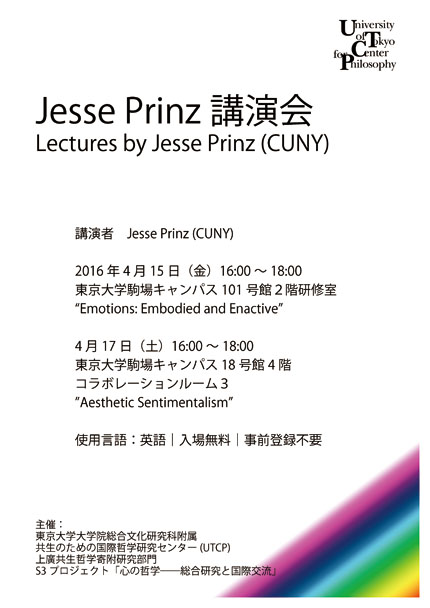
|
Title: | Lectures by Jesse PrinzFinished |
||
|---|---|---|---|---|
| Date: | 16:00-18:00, April 15 and 16, 2016 |
Place: | Seminar Room, 2F, Bldg. 101 (15th)/ Bld. 18, 4F, Collaboration Room 3(16th), The University of Tokyo, Komaba |
|
Lectures by Jesse Prinz
April 15(Fri.)16:00~18:00 Seminar Room, 2F, Bldg. 101
“Emotion: Embodied and Enactive”
April 16 (Sat.)16:00~18:00 Bld. 18, 4F, Collaboration Room 3
“Aesthetic Sentimentalism”
Abstracts
“Emotions: Embodied and Enactive”
There is a long tradition relating emotions to the body. According to some authors in this tradition, emotions are not thoughts, but rather they are feelings of changes in the body. In recent decades, evidence from psychology and neuroscience has provided new support for this embodied theory. But the embodied view faces powerful objections as well. Critics believe that the embodied postulates both too few emotions and too many. They are worry that it cannot explain the significance or meaning that emotions have. To address these objections, the embodied view can be combined with a theory of the mind called enactivism, which has been developed to explain aspects of perception. Enactivism offers an account of how responses in the body can create meaning. The approach is controversial as an explanation of perception, but it may be a promising strategy for explaining emotions.
“Aesthetic Sentimentalism”
Sentimentalism is a theory developed by the classical British Empiricists. In the most familiar form, it is a theory about morality. It says that moral judgments are based on emotions. The empiricists also defended a parallel view about art. They said that aesthetic judgments are based on emotions. Emerging theoretical and empirical considerations offer new support for this thesis. Aesthetic sentimentalism bears on a number of core controversies: the nature of aesthetic experience, the nature of evaluation, the specific emotions that underly appreciation, and even the definition of art. Tentative answers to these questions will be presented, along with avenues for future research.
Language: English| Admission free| No registration required

Organized by S3 Project "Philosophy of Mind", Uehiro Research Division for Philosophy of Coexistence, The University of Tokyo Center for Philosophy (UTCP)






